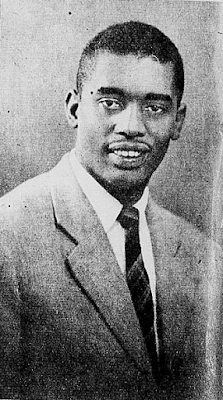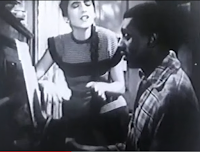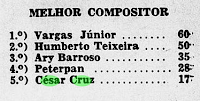Cesar Lúcio da Cruz was born on 5 March 1919, in Cavalcanti-DF, a Northern suburb of Rio de Janeiro-DF. He worked at his father's charcoal shop since childhood. He had a dream of learning how to play the piano which he did in his teenage years at night tuitions. He was then called jokingly as Charcoal Chopin implying both his day-work job and his colour.
In 1937, Cruz did his military duty serving the Brazilian Air Force, polishing airplane wings with wax. In between jobs he would write sambas, waltzes and marches. One day while humming a Saint John-festivity-march about baloons, he was told he should pursue a recording career. He felt self-assured to show the tunet to Carmen Miranda who was then the most popular singer in the country. To his surprise Ms Miranda was very friendly and told him to show 'Sobe meu balão' (Go up my baloon) to her younger sister Aurora Miranda, who recorded it on 1st May 1937, at Odeon just in time for the June festivities. Aurora was accompanied by Benedicto Lacerda & his combo.
Soon after leaving the Air Force, Cesar Cruz was hired by Radio Guanabara as a pianist. At Radio Tupi, he produced 'Passatempo' a vehicle to popular country music duo Alvarenga & Ranchinho.
Cruz moved on to Radio Mauá, where he worked as a pianist and radio producer having met his future wife Sandra Fabian, who worked as a radio-actress there. They married on 20 April 1950, at Saint George church.
Cesar Cruz by 1937, when 'Sobe meu balão' was recorded by Aurora Miranda; Portello Juno his partner.
'Carioca' 1941.
'Carioca' n.352, 1942; 'Carioca' n.368 says Cruz works at both Radio Mayrink Veiga & Transmissora.
Cesar Cruz at magazine 'Carioca' n.368 - 1942; Cruz at Radio Transmissora, 'Carioca' n. 421 - 1943.
'Carioca' n.378 brings a page on Linda Rodrigues in which she expatiates about her preference on literature and music. Cesar Cruz is included in the article declaring his passion for Augusto dos Anjos. Cruz says he was reading Stefan Sweig and Anatole France.
'Carioca' n.381 announces Cesar Cruz has been signed by Radio Guanabara. Cruz worked with new comer Violeta Cavalcanti who became his favourite singer. 1943.
'Carioca' n.383 - By 1943, Cesar Cruz had become a 'talent-scout' having 'discovered' a few new talents like Léa Silva, so-called 'Voz da Beleza' (Beauty's voice).
'Carioca' n.392 - another new talent groomed by Cruz was Dinorah de Andrade - 1943.
'Carioca' n.569 - 1946 - Cesar signs up with Radio Tamoio, playing piano at 'Vesperal das moças' commanded by speaker José Duba.
'Carioca' n.588 - 1947 - 'Quem foi que assobiou, coió?' is Cruz's march for Carnaval 1947.
'Carioca' n.600 - 1947.
'Carioca' n.591 - 1947 - great singer Augusto Calheiros records Cruz's 'Prelúdios de sonata'.
'Carioca' n.631 - 1947 - Odette Amaral records 'Batida de limão' for Carnaval 1948.
'Carioca' n.648- Cesar Cruz is signed by Radio Mauá; 'Carioca' n.653.
'Carioca' n.669, 1948. Cruz with Radio Mauá, owned by trade-unions.
'Carioca' n.679 - 1948. 'Vence a preguiça' (Win the sloth), march performed by de educação-física Oswaldo Diniz Magalhães, for Carnaval 1949; 'Carioca' n.744, 1950 - 'Maria do sobrado', march recorded by Nilo & Gaúcho for Carnaval 1950.
'Carioca' n.688 - 1948.
'Revista do Radio' (1949) reports Augusto Calheiros recorded 'Balada' written by Cesar Cruz, but the real title of the waltz is 'Prelúdios de sonata'; RR n.205 (1953) expatiates about Cruz's piano skills.
'Carioca' n.778 - 1950 - Cruz writes 'Céu azul' with Moreira da Silva; 'Carioca' n.787 - 1950 - Cruz shows up at Zezé Fonseca's programme 'Retiro da saudade' on Radio Continental.
'Revista do Radio' n.28 announces Cesar Cruz's wedding to Radio Mauá's radio-actress Sandra Fabian (real name: Cecília da Silva) on 20 April 1950, at Saint George's church.
'Carioca' n.854 - 1952 - 'Pai Xangô' sung by J.B. de Carvalho is released; 'Carioca' n.953 - 1953 prints the lyrics of 'Perdão', sung by Doris Monteiro in 'Agulha no palheiro' which turned out to be Cesar Cruz's greatest hit ever.
'Perdão' / 'Agulha no palheiro' were both recorded on 9 September 1952.
Doris Monteiro & Cesar Cruz rehearse 'Perdão' as a scene of Alex Viany's 'Agulha no palheiro' (1953).
'Revista do Radio' n. 225 (January 1954) has Cesar Cruz at position 5 of the best song-writers of 1953.
'Carioca' n.910 brings a glossy from Alex Viany's 'Agulha no palheiro' showing Roberto Batalin, Cesar Cruz & Doris Monteiro.
'Carioca' n.926 - Carioca's columnist Van Jafa's review of Alex Viany's 'Agulha no palheiro'.
'Carioca' n.959 - Even though Cruz had already left Radio Mauá in 1954, he was news related to that station like this article about Zani Filho and Martha Reis.
Cesar Cruz at Revista do Radio's dinner-celebration to those who were chosen the Best of 1954 at their categories; Mario Lago (wearing glasses looking towards the camera) was voted 'best radio-actor'; Sivuca (wearing glasses looking straight) best musician; radio-speaker Osvaldo Luiz looks behind... Cesar Cruz was invited by RR's director Anselmo Domingos to be in the panel who chose the 'best of the year'.
'Carioca' n.910 brings a glossy from Alex Viany's 'Agulha no palheiro' showing Roberto Batalin, Cesar Cruz & Doris Monteiro.
'Carioca' n.926 - Carioca's columnist Van Jafa's review of Alex Viany's 'Agulha no palheiro'.
Nelson Pereira dos Santos, Rodrigo de Moraes, Doris Monteiro, Carioca's columnist Van Jafa, Cesar Cruz & Alex Viany at the set of 'Agulha no palheiro' - 1953.
'Carioca' n.954 - 1954; new samba by Cruz, 'Manchetes' performed by Orlando Corrêa; 'Carioca' n. 982 - 1954.'Carioca' n.959 - Even though Cruz had already left Radio Mauá in 1954, he was news related to that station like this article about Zani Filho and Martha Reis.
Cesar Cruz at Revista do Radio's dinner-celebration to those who were chosen the Best of 1954 at their categories; Mario Lago (wearing glasses looking towards the camera) was voted 'best radio-actor'; Sivuca (wearing glasses looking straight) best musician; radio-speaker Osvaldo Luiz looks behind... Cesar Cruz was invited by RR's director Anselmo Domingos to be in the panel who chose the 'best of the year'.
Célia Mara recorded 'Jacaré acanga' b/w 'Choro' in 1956. Both were written by Cesar Cruz.
Cruz at Augusto Calheiros' funeral on 11 January 1956, alongside Henrique Batista, Ratinho, Benedicto Lacerda and others.
Maria Helena Raposo (looking at the camera) with Cesar Cruz at Radio Mayrink Veiga - 'Revista do Radio' n. 411.
'Revista do Radio' n.502, 2nd May 1959.
'Revista do Radio' n. 828.
Cesar Cruz, wife Sandra Fabian & sons Jorge Roberto, Cesar Lucio & Claudio Cesar.
songs written by Cesar Cruz
'Nosso amor' / 'Na cadeia da saudade' (Cesar Cruz-Mario Lattari) 1936 - Sonia de Carvalho
'Sobe meu balão' (César Cruz-Portello Juno) 1937 - Aurora Miranda
'Si fosse verdade' / 'Quem é que diz?' (Cesar Cruz-Aurélio Queiróz) 1938 - Cinara Rios
'Pega ladrão' (Cesar Cruz-Raymundo Ferreira) 1939 - Violeta Cavalcanti
'Despertar de minha vida' (Alvarenga-César Cruz) 1939 Carnaval - Alvarenga & Ranchinho
'Estúdio azul' (César Cruz-Moreira da Silva) 1945 - Moreira da Silva
'Pega ladrão' (Cesar Cruz-Raymundo Ferreira) 1939 - Violeta Cavalcanti
'Despertar de minha vida' (Alvarenga-César Cruz) 1939 Carnaval - Alvarenga & Ranchinho
'Estúdio azul' (César Cruz-Moreira da Silva) 1945 - Moreira da Silva
'Prelúdios de sonata' (César Cruz) 1947 - Augusto Calheiros
'Quem foi que assobiou, coió?' (Cesar Cruz) marcha Carnaval 1947 - Sonia Regina
'Batida de limão' (César Cruz-Rochinho) 1947 - Odete Amaral
'Batida de limão' (César Cruz-Rochinho) 1947 - Odete Amaral
'Definição de amor' (Cesar Cruz-João de Deus Falcão) 1947 - Augusto Calheiros
'Baile das flôres' (Cesar Cruz) 1948 - Odette Amaral
'Vence a preguiça' (Cesar Cruz-Roberto Roberti) marcha 1948 - Oswaldo Diniz Magalhães
'Agua bem gelada' (Cesar Cruz-Pedro Camargo) 1948 - Inezita Falcão
'Maria do sobrado' (César Cruz) 1949 - Nilo & Gaúcho
'Baile das flôres' (Cesar Cruz) 1948 - Odette Amaral
'Vence a preguiça' (Cesar Cruz-Roberto Roberti) marcha 1948 - Oswaldo Diniz Magalhães
'Agua bem gelada' (Cesar Cruz-Pedro Camargo) 1948 - Inezita Falcão
'Maria do sobrado' (César Cruz) 1949 - Nilo & Gaúcho
'Céu azul' (César Cruz-Moreira da Silva) 1950 - Moreira da Silva
'Salve elas' (Cesar Cruz-Maria Borges) 1951 - Marco Antonio
'Salve elas' (Cesar Cruz-Maria Borges) 1951 - Marco Antonio
'Perdão' (César Cruz-Vargas Junior) 1952 - Doris Monteiro
'Agulha no palheiro' (César Cruz-Vargas Jr.) 1952 - Doris Monteiro
'Na encruzilhada' (César Cruz-J. B. de Carvalho) 1952 - J. B. de Carvalho
'Meu palheirinho' (César Cruz) 1952 - Orquestra Rádio sob direção de Cláudio Santoro
'Pedra rolou' (J. B. de Carvalho-César Cruz) 1952 - J.B. de Carvalho
'Denguinho' (César Cruz-Aracy Côrtes) 1953 - Aracy Côrtes
'Moamba' (César Cruz) 1953 - Carmélia Alves
'Manchetes' (Cesar Cruz) 1953 - Orlando Corrêa
'Ai, São João' (César Cruz-Floriano Rios-De Morais) 1953 - De Morais & Doquinha
'Se hoje à noite...' (Cesar Cruz) 1954 - Zilá Faria Alvin
'Ai, São João' (César Cruz-Floriano Rios-De Morais) 1953 - De Morais & Doquinha
'Se hoje à noite...' (Cesar Cruz) 1954 - Zilá Faria Alvin
'Outro caminho' (César Cruz-José Rosas) 1954 - Jimmy Lester
'Letreiros duvidosos' (César Cruz-José Ramos) 1955 - Zaíra Rodrigues
'Palhaço da vida' (César Cruz / Gildo Nunes) 1955 - Wilson Danilo
'Capitão da mata (Sebastião Nunes-César Cruz-Sussú) 1955 - Sussú
'Ultimo trago' (Cesar Cruz) - 1955 - Salvador Guimarães (label: Guanabara)
'Carnaval dos astros' (César Cruz-José Rosas) 1955 - Salvador Guimarães
'Jacaré acanga' (César Cruz-Miguel Lima) Carnaval 1956 - Célia Mara
'Choro' (César Cruz-Ociaece Pereira) Carnaval 1956 - Célia Mara
'Acacamauê' (César Cruz-Miguel Lima) 1956 - Carmen Costa (Copacabana)
'Hotel Avenida' (César Cruz-Silvinha Drumond) 1957 - Carlos Henrique
'Saravá Inhaçã' (César Cruz-Silvinha Drumond) 1957 - J. B. de Carvalho
'Só você' (César Cruz-Silvinha Drumond) 1957 - Geny Martins - 1958 Maria Helena Raposo
'Saravá Inhaçã' (César Cruz-Silvinha Drumond) 1957 - J. B. de Carvalho
'Só você' (César Cruz-Silvinha Drumond) 1957 - Geny Martins - 1958 Maria Helena Raposo
'Por que' (César Cruz) 1957 - Sônia Batista
'Dicionário da gíria' (Dora Lopes-César Cruz) 1960 - Dora Lopes
'Dicionário da gíria' (Dora Lopes-César Cruz) 1960 - Dora Lopes
'Horas de tédio' (César Cruz-Silvinha Drumond) 1960 - Iracema De Barros
'Dias sem sol' (César Cruz-Silvinha Drumond) 1960 - Iracema De Barros
'O índio' (César Cruz-Oclaesse Pereira-José Cornélio-Rodolfo Leite) 1964 - Noemi Bruno
'Poeta maior' (José E. Santo-César Cruz-Pafúncio-Ubirajara Cardoso) - Cardosinho do Império
'Cigana' (Ary Monteiro-César Cruz) 1987 - Roberto Müller
'Dicionário da gíria' written by Cesar Cruz & Dora Lopes, recorded at Discos Rozenblit.






























































